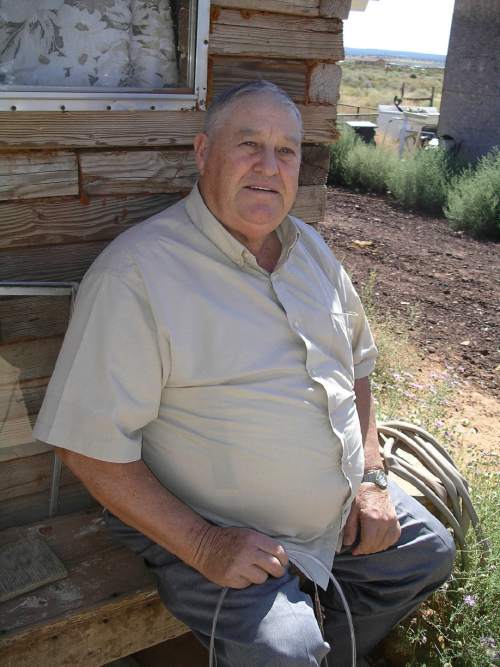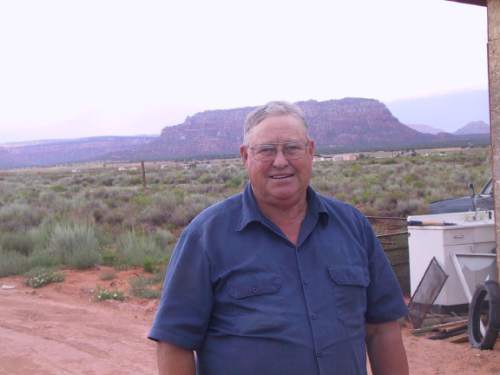This is an archived article that was published on sltrib.com in 2016, and information in the article may be outdated. It is provided only for personal research purposes and may not be reprinted.
Ben Bistline, who wrote a well-received book that documented the rise and shifts of polygamists living in Hildale, Utah, and Colorado City, Ariz., and the forces that created the Fundamentalist Church of Jesus Christ of Latter-Day Saints, died Saturday. He was 81.
Bistline had been blind since at least age 70 and suffered a variety of ailments related to diabetes. His eldest son, Glenn Bistline, said his father died in Hurricane at Hurricane Health and Rehabilitation surrounded by about 10 family members.
Before moving to the care center, Bistline had spent his last years living in Cane Beds, Ariz., just south of Hildale and Colorado City, collectively known as Short Creek, which at the start of the 20th century became an enclave for Mormons wanting to practice polygamy after The Church of Jesus Christ of Latter-day Saints prohibited the practice in an 1890 manifesto.
Bistline wrote "The Polygamists: A History of Colorado City, Arizona." The original version was self-published. Agreka Books published it in 2004, later issuing a condensed version, "Colorado City Polygamists: An Inside Look for the Outsider."
The books explained the origins of the community and how the culture and polygamy changed there over the course of a century through what Bistline contended were lies by the FLDS leadership.
The books had an impact.
In the notes for his book "Under the Banner of Heaven: A Story of Violent Faith," author Jon Krakauer cited the self-published version of "The Polygamists" as his source for Short Creek's history. Subsequent books on the FLDS also have cited Bistline, who received interview requests from print and broadcast journalists across the country.
"His books were like the standards," said Sam Brower, the private detective who wrote the book "Prophet's Prey," which was later made into a documentary. "Even when I was writing my book, when I had a question about details, when did something happen, when did it happen at, I would research in his books."
In Bistline's telling, Short Creek began as a refuge for people wanting to honor the law of polygamy as revealed by Mormon founder Joseph Smith, and to practice a communal form of living. But through the decades, Bistline explained, older men began to marry girls before they could be attracted to boys their own age, boys were evicted to eliminate competition for wives and plural wives were expected to apply for welfare.
In the 1980s, Short Creek fractured over whether a council should continue to make decisions for the community or if governance should be vested in a lone man, called a "One Man Rule."
To persuade the faithful to embrace "One Man Rule," according to Bistline, the FLDS hierarchy began telling the faithful that earlier revelations from leaders that endorsed a council had been sent from Satan and that God had set an order of succession for a leader that the FLDS began referring to as a prophet.
Those wanting a council split and created a new polygamous community south of Short Creek called Centennial Park. They have had far less turmoil and conflict in the last 30 years than have the FLDS, whose current president, Warren Jeffs, is serving a prison sentence in Texas of life plus 20 years for charges related to sexually assaulting two girls he spiritually married.
Bistline wasn't just an observer. He lived much of the history he wrote.
Benjamin Granger Bistline was born April 21, 1935, in Logan. He was the sixth of 10 children born to John Anthony Bistline and Jenny Johnson Bistline. The couple, who belonged to the mainstream Mormon church, lived in Providence at a time when a group of Cache County residents began challenging the church's ban on polygamy.
Then, in 1944, the couple's oldest son, Marine Pvt. John Bistline, Jr., died in the fighting on Saipan. Bistline said the loss persuaded his parents to make a new start. They followed some of the Cache County families to Short Creek in the winter of 1945. Nine-year-old Ben became the first of the Bistline children baptized into the polygamous church.
Bistline's father died in 1949. Bistline's mother then became the fifth wife of Rich Jessop. Bistline eventually asked his stepfather for permission to court one of his daughters, a 15-year-old Annie Jessop. She and Bistline married in 1955. They went on to have 16 children.
Bistline worked as a timber cutter, farmer, contractor and crane operator. He never took a second wife, in part because of the changes he would later write about.
In 2015, in an interview with the podcast Feminist Mormon Housewives, Bistline explained that his stepfather consented to his courtship of Annie on the condition Bistline would practice plural marriage. After they got married, FLDS leaders began assigning all marriages. Bistline was never called upon to take a second wife.
"That got me off the hook then," Bistline said during the podcast. "It was a relief, it really was because I just didn't feel good about going out and courting another girl when married."
Bistline's time following the polygamous church leaders ended in the 1980s, as he began speaking out about the changes he observed. But he and his family remained in a home owned by the United Effort Plan — the land trust founded by FLDS members who consecrated property to the trust on the conditions they and their heirs could live in trust homes.
In a practice that would go on for the next two decades, FLDS leaders in control of the trust in the early and mid-1980s evicted dozens of people from homes in Colorado City and Hildale. Bistline was among the plaintiffs in a lawsuit in which Short Creek residents claimed they were evicted for trivial offenses against FLDS beliefs, for falling out of favor or simply at the whim of leaders. The lawsuit ended with an agreement that the trust could buy them out, or they could live in their homes for their lifetimes.
Bistline continued living in a home in Colorado City until 2003, when the trust agreed to sell him a mobile home in Cane Beds at a low cost and helped the Bistlines move there.
Bistline and his wife joined the mainstream LDS Church in 1992.
Bistline is survived by four of his nine siblings, his wife, 14 children, 92 grandchildren and 40 great-grandchildren. A viewing will be held noon Thursday at the LDS chapel at 82 W. Center Street, in Moccasin, Ariz. Services will be held there at 1 p.m. Burial will follow in Cane Beds.
Among those who read Bistline's books were people who were exiting the FLDS and trying to figure out what had happened to their church.
"That really makes me feel good, that I could help any of them see what was happening," Bistline told The Salt Lake Tribune in 2006.
Twitter: @natecarlisle





